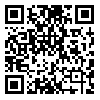BibTeX | RIS | EndNote | Medlars | ProCite | Reference Manager | RefWorks
Send citation to:
URL: http://hayat.tums.ac.ir/article-1-1144-en.html
Background & Aim: Breast cancer is the most common cancer diagnosed in women in both developed and developing countries. Long-term prognosis of breast cancer strongly depends on the stage of disease at diagnosis. More than three months after detecting breast symptoms by Iranian women, they go to visit a doctor. The understanding of life-threatening symptoms and the subsequent responses are differently affected by social interaction networks as well as cultural and social contexts. This study aimed to explore the role of social interactions on health-seeking behaviors among Iranian women with breast cancer symptoms .
Methods & Materials: A qualitative study was conducted using purposive sampling method. Twenty Iranian w omen who attended the Cancer Institute in Imam Khomeini hospital at Tehran University of Medical Sciences and complained of symptoms of breast cancer were recruited to the study du ring 2012-2013. Data were collected through semi-structured and in-depth interviews. Interviews were transcribed and analyzed using conventional content analysis in the MAXqda .
Results: The results revealed three themes including: 1) effectiveness of social learning 2) seeking social support and 3) feedback with a supportive approach which included seven categories of informative social learning, reliable social learning, selective disclosure, seeking information, seeking emotional support , giving reassurance and social support for decision making .
Conclusion: E ffective social learning and supportive interactions have influential role on health seeking behavior. Thus it is necessary to improve public awareness and correct clients' social beliefs about breast cancer to shorten the patients' delay .
| Rights and permissions | |
 |
This work is licensed under a Creative Commons Attribution-NonCommercial 4.0 International License. |





